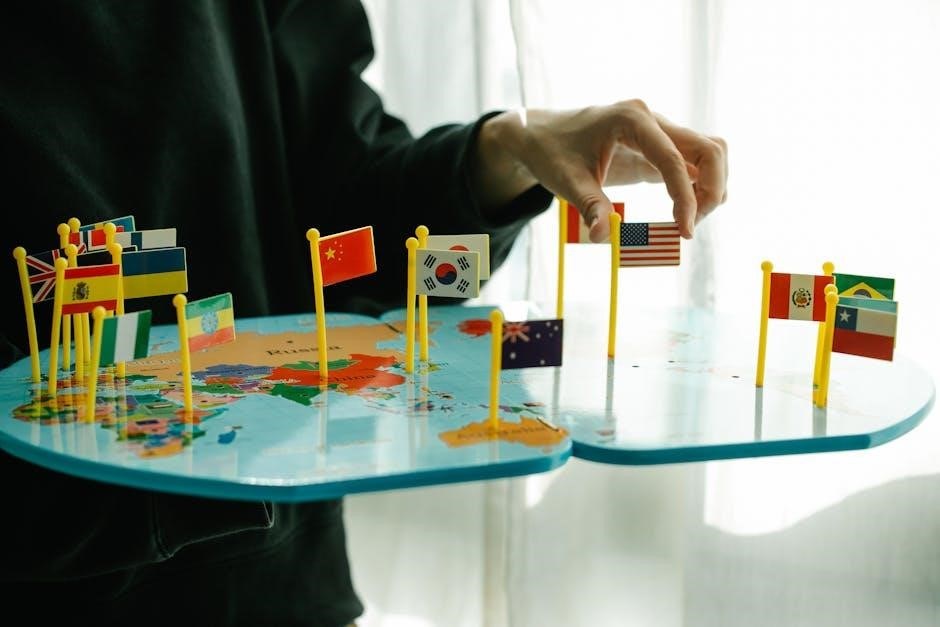a guide to proper dating

Proper dating is about approaching relationships with respect, trust, and honesty․ It involves clear communication, boundaries, and authenticity, fostering genuine connections and healthy partnerships․ By prioritizing these values, individuals can build meaningful relationships based on mutual understanding and respect․
1․1 What is Proper Dating?
Proper dating is an approach to relationships rooted in respect, trust, and honesty․ It involves treating others with kindness, being clear about intentions, and fostering genuine connections․ Unlike casual interactions, proper dating emphasizes building a foundation for healthy relationships through open communication and mutual understanding․ It’s not about playing games or seeking validation but about creating meaningful bonds․ By valuing emotional and physical intimacy, individuals can cultivate deeper connections․ Proper dating also involves respecting boundaries and prioritizing transparency, ensuring both parties feel safe and valued․ This approach helps avoid misunderstandings and lays the groundwork for lasting, respectful partnerships․
1․2 The Importance of Respect and Trust in Dating
Respect and trust are the cornerstones of proper dating, forming the foundation for healthy and meaningful relationships․ Respect involves valuing your partner’s boundaries, opinions, and feelings, while trust is built through reliability, transparency, and honesty; When both parties feel respected and trusted, they can openly communicate and foster emotional intimacy․ Without these elements, relationships often become strained or unstable․ Trust allows partners to rely on each other, creating a safe environment for vulnerability and connection․ Respect ensures that both individuals are treated with dignity, promoting mutual understanding and appreciation․ Together, they create a strong, lasting bond essential for a fulfilling partnership․
1․3 The Evolution of Dating Norms in Modern Society
Dating norms have evolved significantly in modern society, influenced by technological advancements and shifting cultural values․ The rise of dating apps and social media has transformed how people meet and interact, creating both opportunities and challenges․ Traditional methods of courtship have given way to digital communication, with a focus on convenience and accessibility․ However, this shift has also introduced new complexities, such as navigating online etiquette and balancing virtual connections with real-life interactions․ Modern dating emphasizes respect, authenticity, and clear communication, while also encouraging individuals to set boundaries and prioritize their emotional well-being․ These changes reflect a society that values flexibility and inclusivity in relationships․

Preparing for Dating
Preparing for dating involves self-reflection, setting boundaries, and presenting your authentic self․ It’s about understanding your values, improving yourself, and being ready for meaningful connections․
2․1 Self-Reflection and Self-Improvement Before Dating
Self-reflection and self-improvement are crucial before entering the dating world․ Understanding your values, emotional needs, and goals helps you identify what you seek in a partner․ Recognizing areas for personal growth fosters emotional intelligence and maturity․ By addressing past experiences and developing self-awareness, you become better equipped to navigate relationships․ Self-improvement also builds confidence, making you more attractive to potential partners․ Taking time for self-reflection ensures you’re ready to engage in meaningful connections, free from unresolved baggage․ This foundation of self-understanding and growth sets the stage for healthier, more fulfilling relationships․
- Identify your core values and emotional needs․
- Address past experiences and personal growth areas․
- Develop emotional intelligence and maturity․
- Build confidence through self-improvement․
2․2 Setting Personal Boundaries and Expectations
Setting personal boundaries and expectations is essential for a healthy dating experience․ Boundaries protect your emotional and physical well-being, ensuring respect and clarity in relationships․ Clearly defining what you are and aren’t comfortable with helps avoid misunderstandings․ Communicate your expectations early to align values and goals with your partner․ Respectful dialogue about boundaries fosters trust and understanding․ Remember, boundaries are not limitations but signs of self-respect․ Regularly reassess and adjust them as needed to maintain a balanced and fulfilling connection․
- Identify and communicate your non-negotiables․
- Discuss expectations early in the relationship․
- Be open to compromise while respecting your limits․
- Reassess boundaries as the relationship evolves․
2․3 Presenting Your Authentic Self
Presenting your authentic self is crucial for building genuine connections in dating․ Authenticity fosters trust and mutual understanding, allowing relationships to grow naturally; Be honest about your interests, values, and feelings, avoiding pretenses to impress․ Pretending to be someone you’re not can lead to misunderstandings and dissatisfaction․ Embrace your uniqueness and let your true personality shine․ Self-acceptance and confidence attract the right people who appreciate you for who you are․ By being authentic, you create a foundation for meaningful and lasting relationships․
- Be honest about your interests and values․
- Embrace your uniqueness and avoid pretenses․
- Express your true feelings and opinions․
- Self-acceptance attracts the right partners․

Making a Good First Impression
Making a good first impression involves respect, authenticity, and genuine interest․ Be yourself, listen actively, and show curiosity about your partner to create a meaningful connection․
- Be authentic and true to yourself․
- Show genuine interest in your partner․
- Engage in respectful and meaningful conversations․
3․1 The Art of Making a Memorable First Impression
Making a memorable first impression requires authenticity, respect, and genuine interest․ Be yourself, listen actively, and show curiosity about your partner to create a meaningful connection․ A positive attitude, good manners, and thoughtful questions can help you stand out․ Avoid overthinking and focus on building rapport through open and honest communication․ Small gestures, like expressing gratitude or appreciation, can also leave a lasting impact․ Remember, the goal is to be respectful and engaging, not to impress by pretending to be someone you’re not․ A sincere and thoughtful approach will help you make a lasting impression and lay the foundation for a meaningful relationship․
3․2 Choosing the Right Venue for a First Date
Selecting the right venue for a first date is crucial for setting a positive tone․ Opt for a neutral, comfortable location that fosters easy conversation, such as a cozy café, park, or casual restaurant․ Avoid loud bars or crowded spaces that may hinder meaningful dialogue․ Ensure the venue is convenient for both parties and offers a relaxed atmosphere․ Good lighting and a pleasant ambiance can enhance the experience․ Consider safety and accessibility, such as choosing a place near public transport․ Avoid overly formal settings that might create pressure․ The goal is to create an environment where both individuals feel at ease, allowing genuine connection and conversation to flourish naturally․
3․3 Engaging in Meaningful and Respectful Conversations
Meaningful and respectful conversations are the cornerstone of a successful first date․ Start by actively listening to your partner, showing genuine interest in their thoughts and experiences․ Ask open-ended questions to encourage deeper dialogue, avoiding topics that may feel intrusive or overly personal․ Be honest and authentic in your responses, sharing your own stories and feelings to foster connection․ Avoid interrupting or dominating the conversation, ensuring it flows naturally and respectfully․ Pay attention to nonverbal cues, such as body language and tone, to ensure both parties feel comfortable․ By prioritizing respect and empathy, you create a safe and engaging environment for meaningful interaction to thrive․

Effective Communication in Dating
Effective communication involves active listening, empathy, and clear expression of thoughts․ It fosters trust, understanding, and deeper connections, ensuring both partners feel heard and respected in the relationship․
4․1 The Role of Active Listening and Empathy
Active listening and empathy are cornerstone skills in proper dating, fostering deeper connections and understanding․ By fully engaging with your partner, you show genuine interest and care, which strengthens trust and intimacy․ Empathy allows you to see things from their perspective, validating their feelings and creating a safe space for open dialogue․ These practices help prevent misunderstandings and build a foundation of mutual respect, essential for a healthy relationship․ Incorporating these elements ensures meaningful interactions and supports the growth of a strong, lasting bond․
4․2 Expressing Yourself Clearly and Honestly
Expressing yourself clearly and honestly is vital in proper dating, as it fosters trust and intimacy․ Being transparent about your feelings, intentions, and boundaries ensures open communication, helping to avoid misunderstandings․ Honesty builds a foundation of respect, allowing both partners to feel secure and valued․ It’s important to communicate your thoughts kindly and directly, avoiding games or manipulation․ By being authentic, you create a space for genuine connection and mutual understanding․ Clear expression also promotes emotional intelligence, helping you navigate challenges with empathy and respect․ Remember, honesty is key to building a healthy and lasting relationship․
4․3 Asking Open-Ended Questions to Encourage Deeper Connections
Asking open-ended questions is a powerful way to foster deeper connections in dating․ These questions encourage meaningful conversations, allowing your partner to share their thoughts, feelings, and experiences․ Unlike yes/no questions, open-ended inquiries prompt detailed responses, helping you gain insight into their values, interests, and aspirations․ This approach shows genuine interest and curiosity, making your partner feel valued․ It also creates a safe space for vulnerability, strengthening emotional intimacy․ By asking questions like “What inspired you to pursue your passion?” or “How did that experience make you feel?” you can build a stronger, more authentic connection․ This fosters mutual understanding and trust․

Building a Healthy Relationship
Building a healthy relationship involves respect, trust, and open communication․ It requires setting boundaries, fostering emotional intimacy, and maintaining independence while nurturing a strong, supportive partnership․
5․1 Establishing Emotional Intimacy and Connection
Emotional intimacy is the foundation of a healthy relationship, fostering trust and understanding․ It involves being vulnerable, sharing thoughts and feelings openly, and actively listening to your partner; Empathy and compassion strengthen this bond, allowing both individuals to feel valued and supported․ Open communication is key, as it encourages honesty and mutual respect․ By prioritizing emotional connection, couples can navigate challenges together, creating a deeper and more meaningful relationship․ This connection is built on trust, vulnerability, and a willingness to grow together, ensuring a strong and lasting partnership․
5․2 The Role of Trust and Transparency in Relationships
Trust and transparency are the cornerstones of a healthy relationship, fostering a sense of security and mutual respect․ Being honest about your feelings, intentions, and actions builds trust, which is essential for a strong connection․ Transparency ensures open communication, reducing misunderstandings and fostering emotional intimacy․ Reliability and consistency reinforce trust, while vulnerability strengthens the bond․ Without trust, relationships can become fragile and prone to doubt․ By maintaining transparency and trust, partners create a foundation for understanding, respect, and long-term commitment, allowing the relationship to grow and thrive in a supportive and honest environment․
5;3 Maintaining Independence While Building a Partnership
Maintaining independence is crucial while building a partnership, as it fosters personal growth and a healthier relationship․ Pursuing individual interests, hobbies, and friendships ensures that each partner retains their identity and contributes uniquely to the relationship․ A balance between togetherness and independence prevents codependency, allowing both individuals to thrive․ By maintaining autonomy, partners can bring new experiences and perspectives to the relationship, enriching it․ Independence also promotes respect and appreciation for each other’s boundaries and needs․ A healthy partnership encourages interdependence without sacrificing personal freedom, creating a fulfilling and respectful connection where both individuals flourish together and apart․

Navigating Modern Dating
Navigating modern dating involves mastering dating apps, social media, and safety protocols while balancing digital and real-life interactions to foster connections with confidence and respect․
6․1 Understanding the Impact of Dating Apps and Social Media
Dating apps and social media have revolutionized how people connect, offering vast opportunities to meet potential partners․ However, they can also create challenges, such as miscommunication or unrealistic expectations․ Authenticity is key to avoiding misunderstandings․ Using genuine photos and honest descriptions helps attract compatible matches․ Additionally, setting clear boundaries and expectations early on ensures both parties are aligned․ While these platforms can simplify initial connections, they shouldn’t overshadow the importance of meaningful, face-to-face interactions․ Balancing digital communication with real-life engagement is crucial for building authentic relationships․ By being mindful of these dynamics, individuals can navigate the digital dating landscape more effectively and respectfully․
6․2 Safety Tips for Online Dating and First Meetings
Safety is paramount when engaging in online dating and first meetings․ Always choose a public, well-lit location for initial meetups and inform a friend or family member of your plans․ Avoid sharing personal details, such as your home address, too quickly․ Trust your instincts; if something feels off, it’s okay to end the date early․ Keep your phone charged and accessible, and consider letting someone know your estimated return time․ Be cautious with alcohol, as it can impair judgment․ Prioritizing safety ensures a comfortable and secure experience, allowing you to focus on building a genuine connection․
6․3 Balancing Digital Communication with Real-Life Interactions
In today’s digital age, balancing online communication with real-life interactions is crucial for meaningful connections․ While dating apps and social media can facilitate initial contact, over-reliance on digital tools can hinder genuine intimacy․ Set boundaries, such as limiting screen time, to avoid burnout and maintain a healthy perspective․ Prioritize in-person meetings to foster deeper emotional connections and shared experiences․ Avoid using apps as a crutch for avoiding real-life interactions, as this can create a false sense of closeness․ By striking a balance, you can nurture relationships that thrive both online and offline, ensuring a more authentic and fulfilling dating experience․

The Dos and Don’ts of Proper Dating
Be honest, respect boundaries, and communicate clearly․ Avoid manipulation, negativity, or dishonesty․ Show genuine interest and appreciation, fostering trust and intimacy for a healthy, respectful relationship․
7․1 Essential Dos for Building a Healthy Relationship
Be honest and transparent about your feelings and intentions․ Respect your partner’s boundaries and decisions, fostering trust and understanding․ Show genuine appreciation through small gestures, creating a loving atmosphere․ Communicate openly and actively listen to build intimacy and resolve conflicts respectfully․ Encourage independence, allowing both partners to pursue personal interests and maintain individuality․ Be vulnerable and open in sharing thoughts and emotions, strengthening your connection․ Prioritize quality time together, balancing digital interactions with real-life engagement․ Set clear expectations and boundaries early on to avoid misunderstandings․ By following these principles, you lay the groundwork for a respectful, meaningful, and lasting relationship․
7․2 Common Pitfalls to Avoid in Modern Dating
One major pitfall is using dating apps or social media to stalk or manipulate others, which fosters disrespect and mistrust․ Being overly critical or judgmental can discourage genuine connections․ Dishonesty about intentions or feelings undermines trust and leads to misunderstandings․ Disregarding a partner’s boundaries or needs is a significant red flag, as it shows a lack of respect․ Neglecting personal growth or independence can stifle a relationship’s potential․ Avoid hiding information or being inauthentic, as transparency is key to building trust․ Lastly, don’t overlook the importance of balancing digital communication with real-life interactions to maintain a healthy, well-rounded connection․

Avoiding Common Dating Mistakes
Avoiding common dating mistakes involves being honest, respecting boundaries, and staying authentic․ Transparency and trust are key to building lasting, respectful connections․
8․1 Recognizing Red Flags in a Potential Partner
Recognizing red flags in a potential partner is crucial for building healthy relationships․ These signs may include disrespect, dishonesty, or disregard for boundaries․ Pay attention to inconsistent actions, dismissive attitudes, or negative remarks about others․ Trust your instincts if something feels off, as ignoring red flags can lead to emotional harm․ Open communication and active listening can help identify these issues early․ Addressing concerns respectfully or distancing yourself when necessary is essential․ Remember, healthy relationships are built on mutual respect and trust, so prioritizing your emotional well-being is key․ By staying vigilant, you can avoid potential pitfalls and foster meaningful connections․
8․2 Managing Expectations and Avoiding Disappointment
Managing expectations is vital to avoid disappointment in dating․ Unrealistic standards, often influenced by societal ideals or romantic media, can lead to dissatisfaction․ It’s important to align your expectations with reality, focusing on what truly matters in a partner․ Communicate openly with your partner about your needs and boundaries to ensure mutual understanding․ Avoid assuming your partner will fulfill every desire; instead, foster a relationship built on respect and compromise․ By setting realistic goals and embracing the uniqueness of your connection, you can cultivate a healthier, more fulfilling relationship․ Balancing optimism with practicality helps navigate dating with clarity and emotional resilience․
8․3 Handling Rejection with Grace and Maturity
Rejection is an inevitable part of dating, but it doesn’t define your worth․ Handling it with grace and maturity involves accepting the situation without taking it personally․ Understand that rejection often reflects compatibility issues rather than personal flaws․ Avoid negative self-talk and focus on self-care to maintain emotional well-being․ Use rejection as an opportunity to learn and grow, refining your approach for future connections․ Keeping a positive outlook ensures resilience and openness to new possibilities․ Remember, rejection brings you closer to the right match, so embrace it as a stepping stone toward meaningful relationships․

Building a Future Together
Building a future together requires trust, respect, and open communication․ Plan thoughtfully, align goals, and nurture mutual growth, ensuring a strong foundation for lasting partnership․
9․1 Communicating Long-Term Goals and Aspirations
Communicating long-term goals and aspirations is vital for building a future together․ Openly discussing your visions, values, and priorities ensures alignment and understanding․ Be honest about your ambitions, whether personal or professional, and actively listen to your partner’s goals․ This fosters trust and clarity, helping you both navigate life’s challenges as a team․ Sharing aspirations creates a sense of unity and purpose, while respecting each other’s individuality․ Regular conversations about long-term plans strengthen your bond and ensure you’re moving in the same direction․ Vulnerability and transparency in these discussions are key to fostering a supportive and understanding partnership․
9․2 Navigating Conflicts with Respect and Understanding
Navigating conflicts with respect and understanding is crucial for a healthy relationship․ Approach disagreements with empathy, actively listening to your partner’s perspective without interrupting․ Avoid blaming or being defensive; instead, focus on finding solutions together․ Use clear and honest communication to express your feelings calmly․ Respect each other’s boundaries and opinions, even when they differ․ Taking breaks to cool down can prevent escalation․ Conflict resolution strengthens trust and intimacy when handled thoughtfully․ By addressing issues with patience and understanding, you foster a deeper connection and create a foundation for long-term harmony․ Effective conflict navigation shows commitment to growth and mutual respect․
9․3 Planning for a Future Together Thoughtfully
Planning for a future together requires open and honest communication about long-term goals, values, and aspirations․ Discuss topics like family, career, and lifestyle to ensure alignment․ Respect each other’s individuality while exploring shared visions․ Set realistic expectations and understand that plans may evolve․ Regularly revisit and adjust goals to accommodate growth and changes․ Maintain independence while building a life together, ensuring personal interests and hobbies remain a priority․ Approach planning with patience, empathy, and flexibility, fostering a sense of teamwork․ By thoughtfully considering your future, you create a strong foundation for a harmonious and fulfilling partnership built on mutual respect and understanding․
Proper dating is rooted in respect, trust, and honest communication․ By fostering genuine connections and prioritizing mutual understanding, individuals can build meaningful, lasting relationships that thrive on empathy and respect․
10․1 Recap of Key Principles for Proper Dating
Proper dating revolves around respect, trust, and honesty, forming the foundation for meaningful connections․ Setting clear boundaries and communicating openly ensure mutual understanding․ Authenticity is crucial, allowing individuals to present their true selves․ Emotional intelligence and empathy foster deeper intimacy, while transparency builds trust․ Balancing digital interactions with real-life engagement maintains a healthy perspective․ Prioritizing safety, especially in online dating, is essential․ By embracing vulnerability and showing appreciation, relationships grow stronger․ Ultimately, proper dating is about creating honest, respectful connections, laying the groundwork for lasting partnerships built on mutual respect and understanding․
10․2 Final Thoughts on Building Meaningful Connections
Building meaningful connections requires effort, patience, and genuine intent․ By staying true to oneself and approaching relationships with empathy, trust, and respect, individuals can foster deep and lasting bonds․ Effective communication, active listening, and vulnerability are key to understanding each other’s needs and desires․ Navigating modern dating with balance, whether online or offline, ensures a healthy perspective․ Remember, meaningful connections are rooted in mutual respect and honesty, creating a foundation for relationships that grow and thrive over time․ Embrace the journey with openness and kindness, and prioritize building connections that enrich your life and the lives of others․




